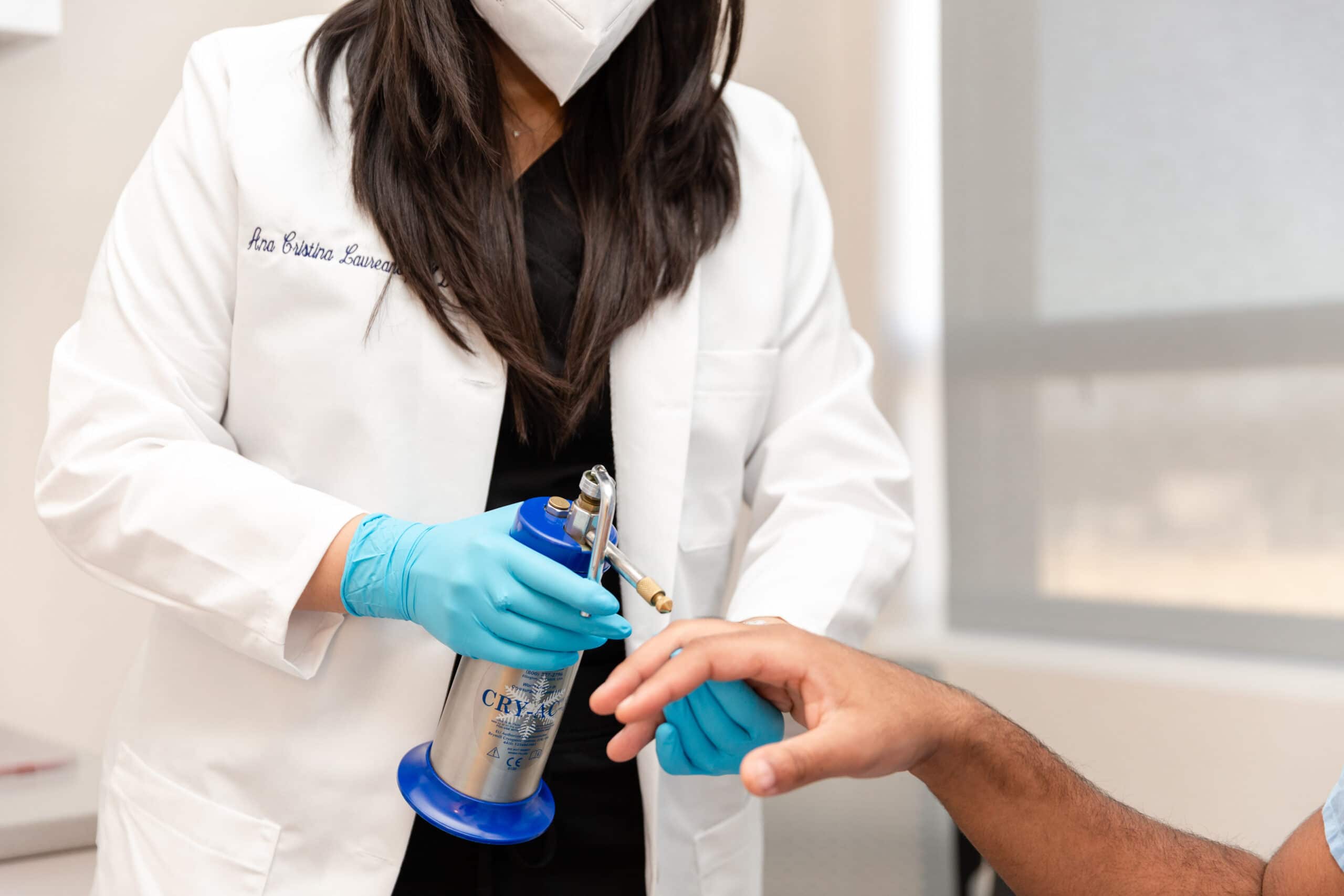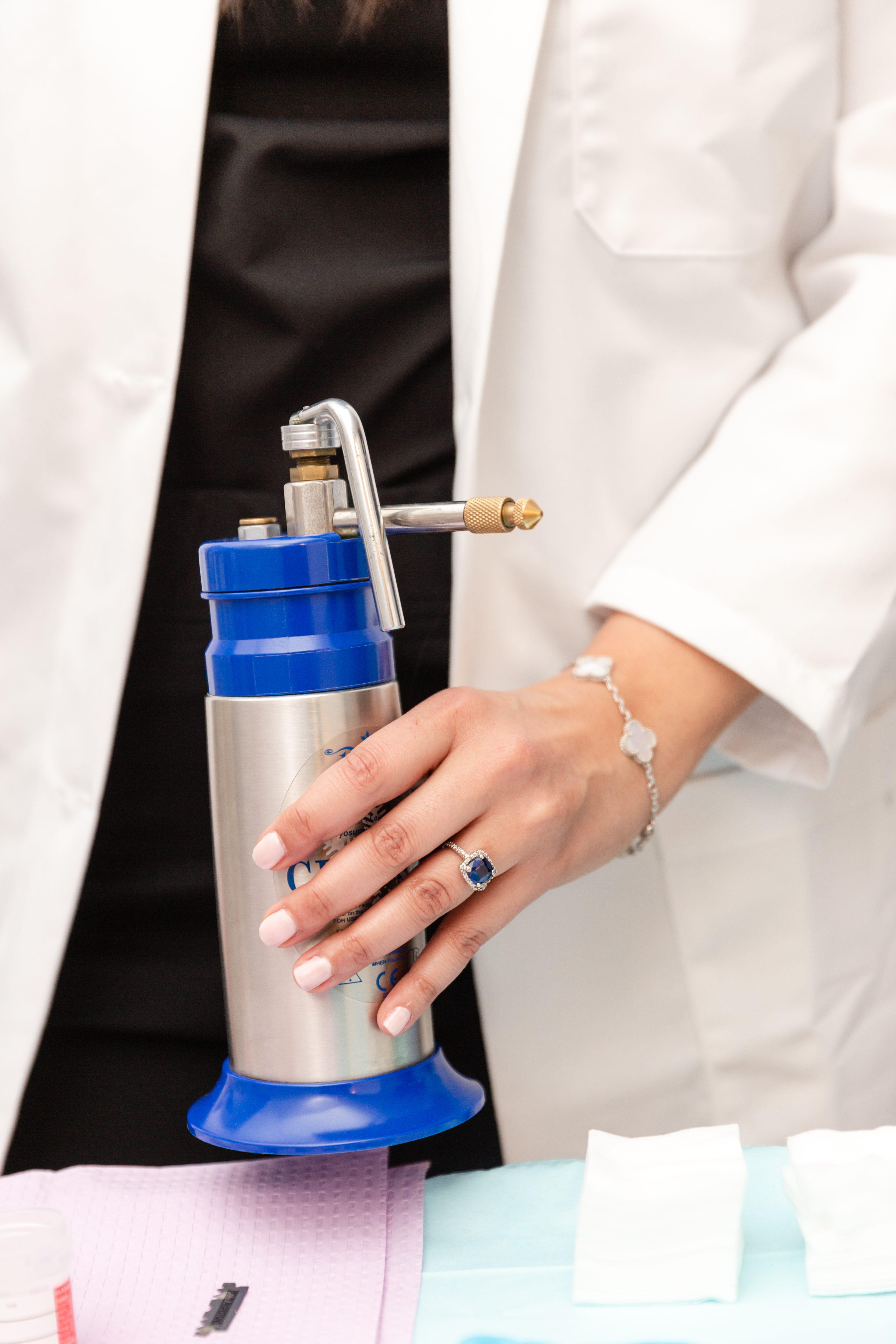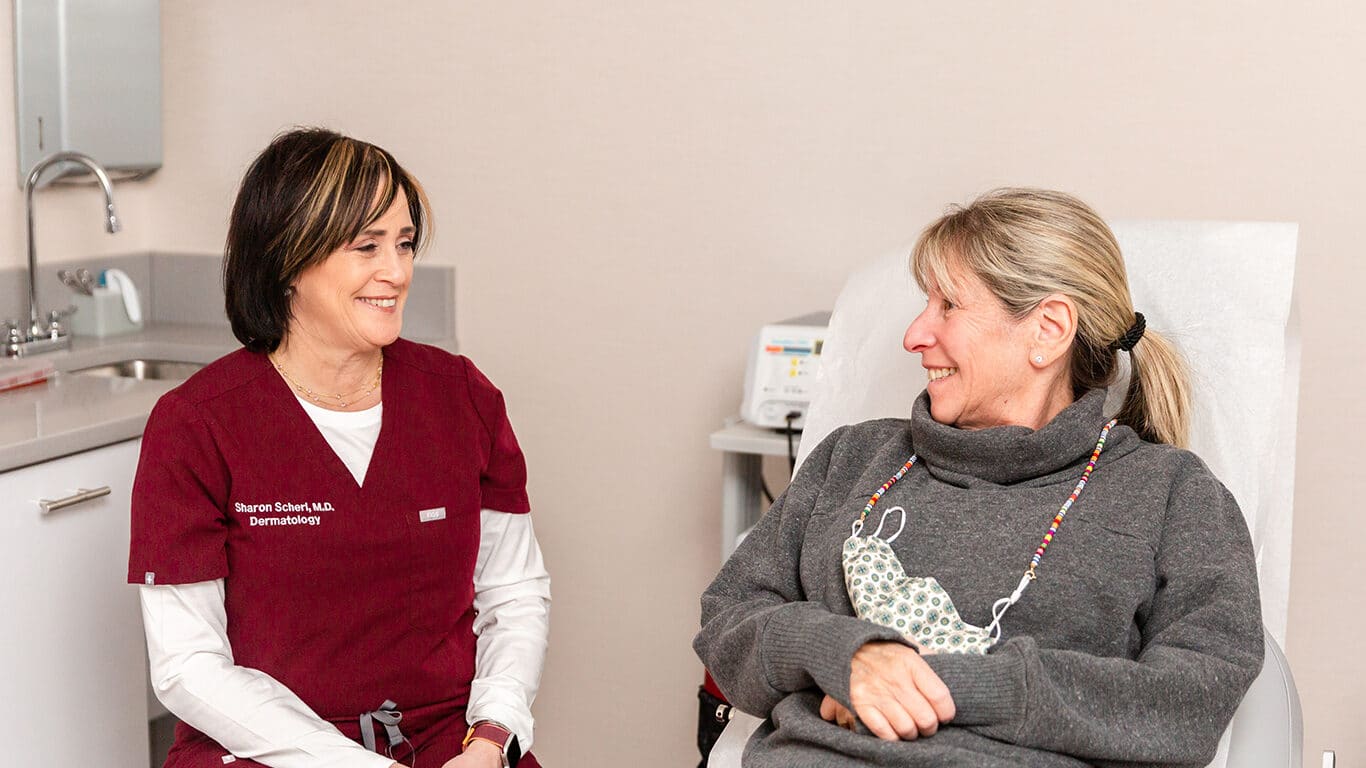
Warts
Warts are small, harmless growths that appear most frequently on the hands and feet. Sometimes they look flat and smooth, other times they have a dome-shaped or cauliflower-like appearance.
Warts can be surrounded by skin that is either lighter or darker. Warts are caused by different forms of Human Papilloma Virus (HPV). They occur in people of all ages and can spread from person-to-person and from one part of the body to another. Warts are benign (noncancerous) and generally painless. They may disappear without any treatment. However, in most cases eliminating warts takes time.
Types of Warts
The location of a wart often characterizes its type:
- Common warts can appear anywhere on the body, although they most often appear on the back of fingers, toes and knees. These skin-colored, dome-shaped lesions usually grow where the skin has been broken, such as a scratch or bug bite. They can range in size from a pinhead to 10mm and may appear singly or in multiples.
- Filiform warts look like a long, narrow, flesh-colored stalk that appears singly or in multiples around the eyelids, face, neck or lips. They are sometimes called facial warts. They may cause itching or bleeding, but are easy to treat with over-the-counter medications.
- Flat (plane) warts appear on the face and forehead. They are flesh-colored or white, with a slightly raised, flat surface and they usually appear in multiples. Flat warts are more common among children and teens than adults.
- Genital warts appear around the genital and pubic areas. It is also possible to get genital warts inside the vagina and anal canal or in the mouth (known as oral warts). The lesions start small and soft but can become quite large. They often grow in clusters. They are both sexually transmitted and highly contagious. In fact, it is recommended you generally avoid sex with anyone who has a visible genital wart. Genital warts should always be treated by a physician.
- Plantar warts appear on the soles of the feet and can be painful since they are on weight-bearing surfaces. They have a rough, cauliflower-like appearance and may have a small black speck in them. They often appear in multiples and may combine into a larger wart called a mosaic wart. Plantar warts can spread rapidly.
- Subungual and periungual warts appear as rough growths around the fingernails and/or toenails. They start as nearly undetectable, pin-sized lesions and grow to pea-sized with rough, irregular bumps with uneven borders. Subungual and periungual warts can impede healthy nail growth. Because of their location, they are difficult to treat and generally require medical attention.
Treatments for Warts
Most warts respond to over-the-counter treatments, as well as:
- Cryotherapy, which freezes off the wart using liquid nitrogen or nitrous oxide.
- Electrosurgery, which sends an electric current through the wart to kill the tissue.
- Laser surgery, which essentially heat up the wart until the tissue dies and the wart eventually falls off.
- Nonprescription freezing products (dimethyl ether), aerosol sprays that freeze the warts and cause them to die off.
- Salicylic acid preparations, which dissolve the protein (keratin) that makes up the wart and the thick layer of skin that covers it. It comes in gels, pads, drops and plasters and takes 4 to 6 weeks to eradicate the warts.
If self-treatments don’t work after a period of about 4 to 12 weeks, contact our dermatologist. We’ll assess your warts and recommend the best option. Always contact the dermatologist if a wart is causing pain, changes in color or appearance and for all genital warts.

LEARN MORE AT YOUR CONSULTATION IN ENGLEWOOD CLIFFS, NJ TODAY
If you have a wart that hasn’t responded to at-home treatment, contact our office today to schedule your consultation and get the care you need.
OTHER Skin Conditions
Acne
Acne is the most common skin condition in the United States. Although it’s common, accurate information about acne can be scarce.
Acne Cysts
An acne cyst forms when the pore fills with dead skin cells oil, and bacteria. A cyst goes deep into the skin and can hurt.
Actinic Keratosis
An actinic keratosis or AK is a rough, dry, scaly patch or growth that forms on the skin. An AK forms when the skin is badly damaged by ultraviolet (UV) rays from the sun or indoor tanning.
Alopecia (Hair Loss)
Millions of people experience hair loss. Some people see their hair re-grow without doing anything. Others need treatment for their hair to re-grow. Sometimes, hair will not re-grow.
Atopic Dermatitis/Eczema
This is a common skin disease in children. Children often get atopic dermatitis (AD) during their first year of life. If a child gets AD during this time, dry and scaly patches appear on the skin.
Atypical Mole (Dysplastic)
This type of mole can look like melanoma. It is not melanoma. But you have a higher risk of getting melanoma if you have certain risk factors.
Basal Cell Carcinoma
Basal cell carcinoma (BCC) is the most common form of skin cancer. More than two million cases of this skin cancer are diagnosed in the United States each year.
Bed Bugs
Bedbugs are tiny insects that feed on human blood. They hide in dark places close to where humans sleep and usually crawl out to feed while people are fast asleep.
Dry Skin
Dry skin is common. It can occur at any age and for many reasons. Using a moisturizer often helps repair dry skin.
Eczema
Eczema is a word that means irritated skin. Doctors don’t really know why some kids and adults get eczema, and others don’t. They think it might happen for a variety of reasons.
Thousands of People in the Metro Area Trust Scherl Dermatology
CONTACT US
Scherl Dermatology
Englewood Cliffs, NJ 07632
Same-Day Appointments Now Available


CONTACT US
Scherl Dermatology
140 Sylvan Ave. Suite 302,
Englewood Cliffs, NJ 07632
Same-Day Appointments Now Available
Scherl Dermatology
©2024 Schweiger Dermatology Group. All Rights Reserved. Privacy Policy | The information available on this website is provided for informational purposes only. This information is not intended to replace a medical consultation where a physician's judgment may advise you about specific disorders, conditions and or treatment options. We hope the information will be useful for you to become more educated about your healthcare decisions. If you are vision-impaired or have some other impairment covered by the Americans with Disabilities Act or a similar law, and you wish to discuss potential accommodations related to using this website, please contact us at 201.568.8400 .

